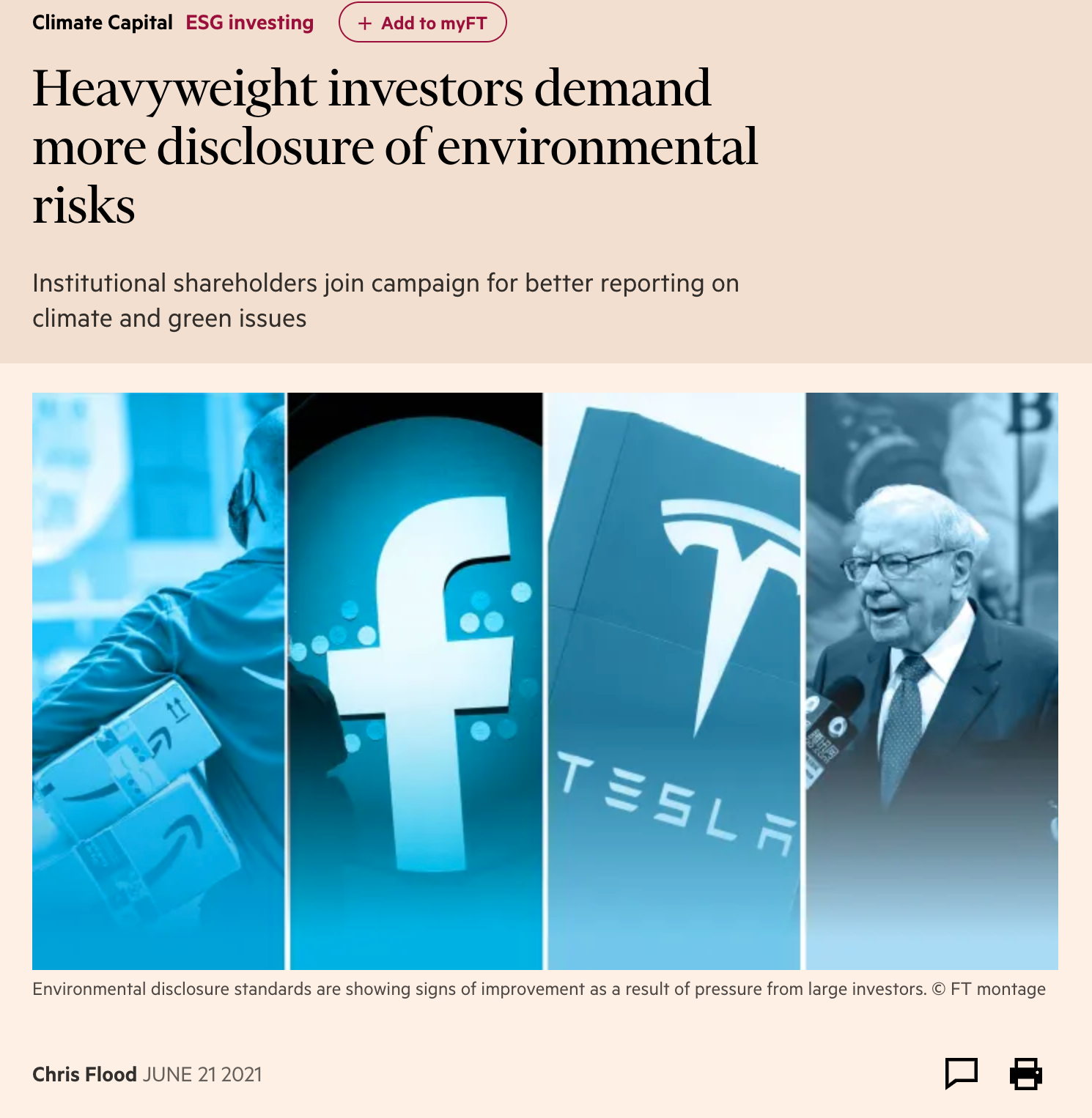The mid and long-term effects of the pandemic on M&A
Kalita Partners - Summer Series 2021 - Part 3/4
(Read Part 1 & Part 2)It was only fifteen years ago that the movie An Inconvenient Truth was released and the presidential candidate Al Gore lent his brand to amplify scientific messages on climate change, which at the time, despite being an award winning documentary, was met with a lot of scepticism from the political and business audiences.
In June 2021 the draft of the Sixth Assessment Report of the Intergovernmental Panel on Climate Change (IPCC) intended for the UN and its key policymakers was leaked, and obtained by a news agency headquartered in Paris. For anyone following climate science, the content and the list of tipping points beyond which the world's ecosystems would start collapsing - did not come as a surprise. However, it is still concerning to read that "Life on Earth can recover from a drastic climate shift by evolving into new species and creating new ecosystems, but Humans cannot" and that there are "progressively serious, centuries' long and, in some cases, irreversible consequences".
According to MSCI, a leading trend-spotter for the global investment community, the key investment topics for creating long term deal value in 2021 and beyond include the environmental and biodiversity crisis, social inequalities and ESG reporting preparedness. ESGs are metrics that measure a company's environmental, social, and governance progress, and in January of this year, over 60 large corporations announced that they will be adopting the ESG reporting framework in partnership with the World Economic Forum.
The ESG standards set out the criteria for impact on the environment from the commercial company’s operations, management of employees in corporate and social responsibility endeavours, and leadership diversity and inclusiveness - thus aiming to share the value created by the company - not only with its shareholders - but also with the wider group of the company’s stakeholders. It is anticipated that 21 ESGs reporting standards will be created shortly and the compliance reports are to be externally audited as part of the annual financial reporting of the participating companies. From an M&A perspective, the importance of early identification and analyses of the environmental, social and governance policies and standards adopted by the potential target company - increases the Buyer’s prediction of success or potential failure of the contemplated transaction.

A particularly good example of lack of ESGs alignment is the failed Warren Buffett backed, US$143 billion bid by Kraft Heinz to acquire Unilever in early 2017. Professional observers, Unilever’s CEO, Paul Polman, and company’s shareholders were of the view that there was a polar difference between the corporate cultures of the two companies. Whilst Kraft Heinz’s focus was on maximising short-term value through cost-reducing strategy following acquisitions, Unilever, since 2010, had committed to its Sustainable Living Plan to address global social and environmental issues and emphasise on responsible capitalism through sustainable business practices and preservation of its brand’s reputation. Kraft Heinz, backed by Buffett and 3G Capital decided that the anticipated post-acquisition integration synergies would not have been achieved and retreated.
Contemporary CEOs of strategic corporate Buyers and their M&A teams need to be aligned to the changing shareholders’ views on ESG matters. Shareholders, financial lenders, employees, consumers and regulators are asking not only if the business is making profits but how is the business doing so. Increasingly CEOs’ remuneration is linked to business performance regarding ESG issues. Hence when assessing acquisition opportunities it is required to have a risk based approach that reconciles the short term and perception led focus of certain stakeholders to the long-term, future risk of liabilities focus that underpins the longevity and sustainability of a business. The next pandemic-type of event might not be a virus, but a lack of electricity for example. If a Buyer is considering investing in technology businesses that are heavily reliant on energy, perhaps looking out further and also acquiring a solar company to reduce the risk to the supply of electricity is the way forward.
So what might happen if Buyers do not think about the biosphere risks and natural capital of the companies they are buying?
- To start, the discounted cash flow model may be considerably skewed if considerations including future government regulations on climate (such as emissions), weather and natural resources provisioning are not considered, or high cost of debt for companies in environmentally polluting industries are omitted from the calculations of lenders’ interest rates and overall weighted average cost of capital.
- Next, the value of capex of the company to be acquired might be invalidated as capex could require significant decommissioning and repurpose funding, the post-acquisition ESG operational and reporting integration and the resulting synergies could take much longer.
- Finally, a lack of or weak governance and compliance with existing environmental regulations by a potential target company, could have significant consequences for the Buyer post-acquisition, including fines, financial settlements, and costly damage to the brand reputation. Therefore, it is imperative that during the due diligence process the Buyer performs suitable diligence to identify potential ESG risks, address them commercially in the acquisition agreement during the negotiations with the Seller, and prepare a plan for adoption of ESG standards and reporting readiness.

Joseph Naayem, CFA, Managing Partner, Kalmus Capital
"We are at the end of the road and find ourselves surrounded by kicked cans. When all stakeholders including regulators, central banks and public authorities converge to change the rules of the game, investors can no longer afford thinking in a linear manner even if they make a step change. Managing perception rather than addressing underlying ESG challenges will hurt valuations if companies try and flatter their ESG ratings by disposing of "brown assets" and acquiring "green ones" at any price."
* * *
This article was written with the support of Joseph Naayem, CFA, Managing Partner, Kalmus Capital. This series is authored by Kalita Partners with the contribution of Kamelia Kantcheva, Julien Artero, and Giulia Tesauro.
* * *
Kalita Partners helps businesses respond quickly and discreetly to complex and sensitive situations.
Kalita Partners was founded in London in 2019 to assist clients during special situations. Such atypical events which have the potential to dramatically alter the future course of business, reputation, and value. Our team and network of highly experienced forensic investigation and business intelligence professionals helps clients react quickly to special situations. We typically assist clients during complex disputes, cross-border asset tracing & recovery, fraud & corruption investigations, and other financial crimes and misconduct. We often work on the most complex situations in the most challenging jurisdictions. Therefore, we understand the importance of combining flexibility, cultural diversity, creativity, and expertise in everything we do.

